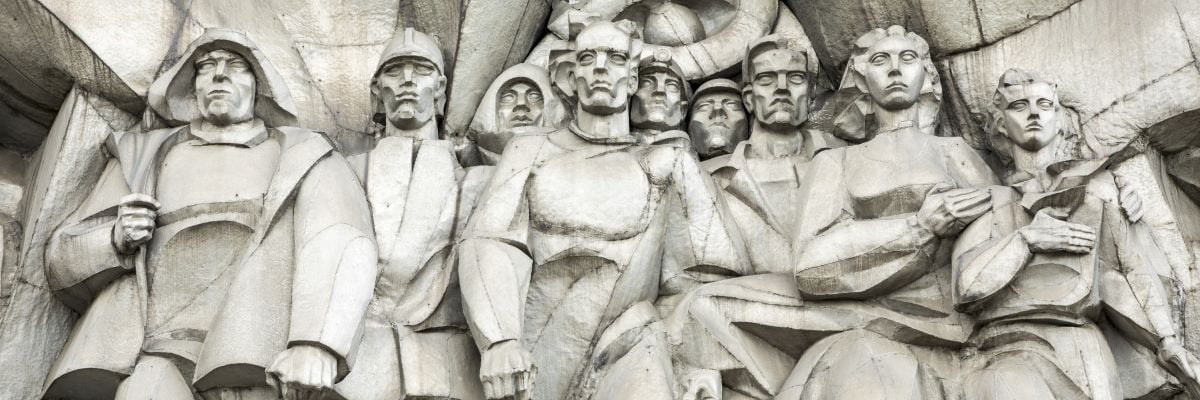Can a Catholic Be a Democratic Socialist?
The Catechism of the Catholic Church says, “The Church has rejected the totalitarian and atheistic ideologies associated in modern times with ‘communism’ or ‘so...

www.catholic.com
The
Catechism of the Catholic Church says, “The Church has rejected the totalitarian and atheistic ideologies associated in modern times with ‘communism’ or ‘socialism’” (2425). This does not mean, however, that Catholics can embrace a kinder, “Christian” socialism in its place. Pope Pius XI famously declared, “Religious socialism, Christian socialism, are contradictory terms; no one can be at the same time a good Catholic and a true socialist” (
Quadragesimo Anno, 120).
OP comment: Democrats are the party of Socialism, Sodomy (gay marriage), Infanticide (late term abortion). Those are plain facts. No Christian, be they Catholic or otherwise, can be a democrat.
The Catechism of the Catholic Church says, “The Church has rejected the totalitarian and atheistic ideologies associated in modern times with ‘communism’ or ‘so...

www.catholic.com
So, in order to analyze democratic socialism, we must distinguish
social welfare policies Catholics can reasonably disagree about with
socialist policies no Catholic can support.
The government can provide benefits to people through social welfare programs such as food stamps or education grants, and people are free to gauge and debate the effectiveness and value of such programs. John Paul II warned, though, that if the “welfare state” grew too large, it would result in “a loss of human energies and an inordinate increase of public agencies, which are dominated more by bureaucratic ways of thinking than by concern for serving their clients, and which are accompanied by an enormous increase in spending” (
Centesimus Annus 48).
In contrast to
social welfare programs, the government could provide these goods directly through socialist programs such as government-run schools, hospitals, and grocery stores. Since socialism is often gradually introduced to societies through public policy, Catholics should approach with a healthy dose of skepticism government policies that seek to nationalize entire industries.
Of course, the existence of some nationalized industries does not mean a country has embraced full-fledged socialism. For example, having government-run schools in the United States does not mean we are a socialist country such as the Soviet Union (though that wasn’t for a lack of trying).
In 1922, Oregon tried to outlaw private and religious schools, and it was only a 1925 Supreme Court decision that kept the state from winning a monopoly on education. Pope Pius XI quoted this decision in
Divnii Illius Magistri when he wrote, “The child is not the mere creature of the state” (37). Contrast this with Karl Marx’s collaborator Friedrich Engels,
who dreamed of a time when “the care and education of the children become a public affair; society looks after all children alike.” In fact,
in Sweden (a country many Democratic socialists hold up as an ideal), homeschooling is illegal, and
in neighboring Finland private schools are practically nonexistent.
In the United States, the government on many levels provides many health care services. Yet a fully socialist health care system—an idea that more political candidates are beginning to float and more voters entertain—would be another example of central planning that should concern Catholics.
If the government has the only say over what services a hospital offers, then Catholic hospitals (to whatever extent they could remain identifiably so)
could be mandated to provide contraception and to perform sterilizations, abortions, and so-called “sex-reassignment” surgeries, among other morally objectionable things. There would also be concerns about
the state’s rationing of health care, potentially denying certain ordinary treatments to disabled patients and imposing euthanasia in their place.
Tempting though the idea may be to some, it’s hard to see how Catholics can help create, in Meyer’s words, “a democratic road to socialism.” The Church’s condemnations against socialism would have remained the same even if Lenin, Mao, Pol Pot, and other socialist leaders had been elected through a democratic process. Moreover, the Church has been aware of a peaceful “moderate socialism” for a long time and still rejects it as being a promotion of Christian values under the socialist banner with an eye toward enacting true socialism in the future.
Pope Pius XI said, “Such just demands and desire have nothing in them now which is inconsistent with Christian truth, and much less are they special to socialism. Those who work solely toward such ends have, therefore, no reason to become socialists” (
Quadragesimo Anno 115). Thirty years later Pope John XXIII reaffirmed the Pope’s contention saying:
Pope Pius XI further emphasized the fundamental opposition between Communism and Christianity, and made it clear that no Catholic could subscribe even to moderate socialism. The reason is that socialism is founded on a doctrine of human society which is bounded by time and takes no account of any objective other than that of material well-being. (Mater et Magistra, 34)
As we show in our new book
Can a Catholic be a Socialist?, socialism is evil in principle because it deprives people of their natural rights and treats them as products of the state to be sculpted and used instead of creations of God to be dignified and respected. Furthermore, socialism is unworkable because it doesn’t “see the world as it really is” and, as a result, leads to physical evils such as food shortages and the neglect of natural resources and environments. The physical and moral evils of socialism become clear once one examines the history of both socialism and the Catholic Church’s response to it.

